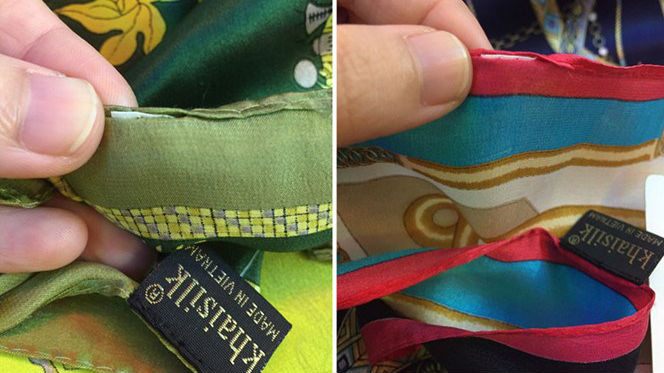Vietnam turns semiconductor vision into action
The global semiconductor industry is being reshaped by geopolitical tensions, shifting supply chains, and the surge of digital technologies.




Lost money may be recovered, but a damaged repudiation could be very hard to rebuild.

Corporate scandals happen all over the world, and Vietnam is certainly not immune to them. It is also true that when corruption, tax evasion, fraud and other crimes are exposed at big firms, these misdeeds become a public problem due to their impact on the broader economy and society.
Fortunately, the recent controversy involving Khaisilk does not qualify as a major disaster. It is not a public entity and does not need to be “bailed out” with taxpayer money. Its transgressions are nowhere near as problematic as Volkswagen faking the emissions tests for its vehicles or Bernie Madoff defrauding billions of dollars from investors through a “Ponzi scheme.”
What Khaisilk had admitted to – attempting to pass-off up to 50% of its silk scarves as authentic local products when they were actually sourced from a third party supplier in China – did not harm the environment or put the public in danger. The authorities have not made any conclusions about the extent of wrongdoing, but it seems like a relatively minor embarrassment compared with other tales of corporate misdeeds in Vietnam and elsewhere.
Nevertheless, the story has provoked widespread dismay in Vietnam, thereby prompting efforts at PR spin and damage control on the part of Khaisilk. In his public statement, company founder Hoang Khai apologized for the “unclear positioning” of Khaisilk products, but he also sought to minimize the scandal by invoking H&M and Zara, which are European brands that make garments in China.
Obviously, this is a false equivalence. H&M and Zara use Chinese suppliers, but they do not attempt to conceal this fact by covering the “Made in China” label with ones that say “Made in Sweden” or “Made in Spain.” Moreover, H&M and Zara do not offer any pretence to be selling premium quality or unique products. They are “fast fashion” brands that sell trendy and reasonably priced goods in huge, impersonal stores around the world.
Khai suggested that his China-made products were still stylish and good in quality, thus implying that his customers should not be so upset. However, this is another dubious claim. If it were reasonable, why bother covering the “Made in China” label to begin with?
The answer to that question is obvious. In many industries, products from certain nations enjoy a prestige that marketing experts call “country of origin bias.” Examples include Japanese and German machinery, French wines, American universities and Swiss watches.
However, this is not the only kind of bias that exists. People are also willing to pay extra for something perceived as more intimate, exclusive or authentic (handmade crafts or boutique resorts, for example). For many years, Khaisilk was a beneficiary of this kind of bias.
Khaisilk is not Hermes or Prada, as very few people outside of Vietnam have even heard of the brand. Nevertheless, its chic and relatively pricey boutiques in Vietnam were popular among both locals and international tourists, who often bought them as gifts and souvenirs. Customers viewed the brand’s garments as elegant, good in quality and locally made, but the recent scandal may have done irrevocable harm to that image, at least among domestic costumers (who are much more likely to be aware of this story than tourists).
In America, we have a saying that one should be careful not to “throw the baby out with the bathwater.” The meaning is that being careless about something that seems trivial can lead to the loss of something precious. Perhaps this is the main lesson that Vietnamese firms should draw from the Khaisilk scandal.
Khaisilk is a large firm engaged in several businesses, including restaurants, hotels and convention centers. Many of the firm’s products and projects have a strong reputation, and deservedly so. Moreover, the profit gained from misrepresenting some China-made garments as Vietnamese was probably not much in the bigger scheme of things. But in business, no laws are stating that the “punishment must fit the crime.” Indeed the negative impact of this scandal on Khai Silk may end up being far more severe than any unprofitable product or failed investment. Lost money may be recovered, but a damaged repudiation could be very hard to rebuild.
*The author is Business Development Manager at Global Integration Business Consultants in Ho Chi Minh City
The global semiconductor industry is being reshaped by geopolitical tensions, shifting supply chains, and the surge of digital technologies.
The change in APA approval authority is expected to shorten processing time and enhance business proactiveness in international tax negotiations.
As hybrid cloud systems grow more complex, Vietnamese enterprises are struggling to detect cybersecurity threats moving laterally within their own networks.
The submission of the draft resolution on Vietnam’s international financial center to the National Assembly heralds a new developmental era for the country.
More than just running a 5-star resort, Kristian Petersen is redefining the art of hospitality with a humane and sustainable leadership philosophy.
For Tyna Huynh, co-founder of Drinkizz, organic is not just a food choice but a way of life that fosters a deep connection between people, nature and community.